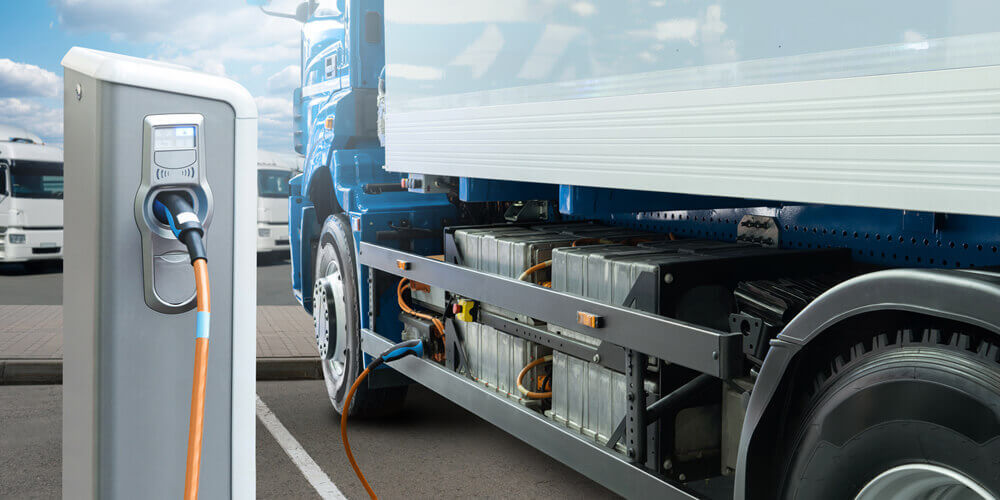Electric vehicles (EVs) are poised to disrupt the transportation industry. The momentum behind fleet electrification is accelerating due to various factors, including:
- Regulatory imperatives
- Lower total cost of EV ownership
- Federal government infrastructure investments
- Increased focus on environmental sustainability alignment
With electrification occurring more rapidly, fleet managers need to understand the vast opportunities that arise from transitioning from Internal Combustion Engine (ICE) vehicles to clean electric vehicles.
Whether you’re planning on adding a few electric vehicles or contemplating complete EV adoption, there are various advantages to transitioning your fleet to electric vehicles.
Top 3 Benefits of Transitioning to an Electric Vehicle (EV) Fleet
Forward-thinking fleet managers forge a path to a brighter, cleaner future when they realize the benefits of electrifying their operations and installing EV charging stations. To encourage clean fleet adoption, here are the top benefits of transitioning to an EV fleet.
1. Reduce Costs
Transitioning to an EV fleet lowers operational costs in several ways, including reducing the total cost of ownership (TCO), decreasing expenditures on fuel, and optimizing electricity usage. Let's take a closer look at each of these cost-saving opportunities.
Lower Total Cost of Ownership
One of the most influential factors spurring EV fleet adoption is the lowered total cost of ownership (TCO). McKinsey predicts that by 2030, EV fleets will have a 15-25% lower TCO than those with ICE vehicles. Higher upfront costs including the purchase of new EVs and installation of charging infrastructure are offset by lower operating expenses, government subsidies, and utility rebate programs.
Electric vehicle maintenance costs are lower than their gas counterparts as EVs are more reliable, have fewer mechanical parts prone to failure, and utilize data to enable preventative maintenance. With EV fleet adoption, fleet managers will no longer need to budget for oil changes, transmission fluid flushes, or other engine fluid replacements. When all the factors are calculated, the estimated cost of maintenance for EVs is less than 6 cents per mile compared to light-duty ICE vehicles at 10.1 cents per mile.
Minimize Fuel Expenditure
Replacing ICE fleets with green fleets offers significant long-term savings as EVs are less expensive to own, maintain, operate, and, most importantly, fuel as electricity is a much cheaper energy source than diesel. Let's take a look at a few eye-opening statistics:
- The average EV costs roughly $485 per year to fuel and maintain, while the average ICE vehicle costs around $1,117 per year.
- Diesel across the United States averages $2.96 per gallon, while electricity prices average only $1.29 per gallon of diesel equivalent.
- Compared to ICE vehicles, EVs are more energy-efficient. EV drive systems are only responsible for a 15-20% energy loss compared to 64-75% for a gasoline engine.
In addition to reduced fuel costs, fleet managers can also improve their budgeting capabilities as they are no longer reliant on volatile fuel prices. Fleet managers can budget fueling costs with increased confidence as electricity prices are far more stable.
Optimized Electricity Usage
Advanced end-to-end EV charging solutions include managed charging software to help fleet managers optimize their electricity usage, further reducing costs. Smart Electric Vehicle Supply Equipment (EVSE) can be programmed to avoid peak pricing and prioritize charging during low electricity rates, ensuring vehicles are fully charged at the right time to maximize cost savings.
2. Improve Operational Efficiency
A qualified third-party EV solution provider will ensure each vehicle is charged to capacity using an optimized rate, extending the life of vehicles and boosting efficiency within operations. With managed EV charging, fleet managers can easily deploy additional EVs without needing a significant electrical infrastructure upgrade. As more EVs are added to the fleet, operators can utilize charging strategies - guided by charging software data - to improve operational efficiency. A staggered approach provides fleet managers the flexibility to charge their vehicles at predetermined intervals.
The enhanced vehicle performance of EV fleets also contributes to improved operational efficiency. The instant torque provided by EVs offers a distinct advantage over combustion engines. Instant torque refers to a vehicle’s ability to move from a complete standstill quicker. Instant torque provides quicker, smoother, and more responsive acceleration. In terms of hauling freight or passengers, maximum instant torque enables trucks to reach speeds quicker with less force. Electrified fleets with instant torque spend less time sitting still and can move through their workload at a much faster rate.
3. Limit Carbon Footprint
The transportation sector - cars, trucks, planes, trains, and boats - has replaced power plants as the top source of greenhouse gas emissions, emitting 1.9 billion tons of CO2 annually. Proactive companies can address these environmental concerns and better align with consumer ideology by electrifying their fleets. Lower corporate carbon footprints and reduced emissions from medium- and heavy-duty fleets have positive ecological impacts and play an integral role in fueling a more cost-efficient and cleaner energy future.
A recent study found that 83% of large commercial fleet operators cite environmental benefits as a top motivation for electrifying fleets. Here are a few sustainability-related benefits associated with EV fleet adoption:
- Improve air quality in local communities
- Reduce risk from potential future environmental regulation
- Solidify reputation as a socially responsible and environmentally compliant business
- Lower CO2 emissions along heavily trafficked transport routes
- Solidify reputation as a socially responsible and environmentally compliant business
- Near-term electrification could achieve a total potential savings of 194,000 tons of CO2 emissions over four years
Power Your Clean EV Fleet with Fast and Reliable Charging
New technologies, infrastructure improvements, emission reduction legislation, and realized benefits including improved operational efficiency, reduced operating costs, and corporate sustainability enablement, have successfully spurred fleet operators to embrace electrification.
Whether you’re contemplating complete EV adoption or planning to add a few electric vehicles, deciding on how your fleet will be charged is crucial. Forward-thinking companies should partner with experienced EV fleet specialists to make the electrification process move as quickly and smoothly as possible. From design considerations and hardware recommendations to infrastructure installation and equipment monitoring, a credible EV charging partner provides end-to-end EV charging solutions and lends their expertise to help fleet managers prepare for the road ahead.






